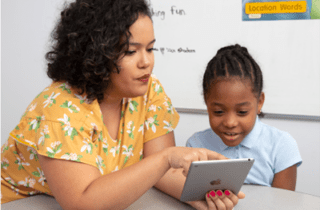Presented by Seth Aldrich, Ph.D., New York State Licensed Psychologist and Bilingual School Psychologist; and Alejandra Estrada-Burt, Ed.D., Co-Principal, Robbinsdale Spanish Immersion School (MN)
Presented by Doris Zahner, Ph.D., Chief Academic Officer, Council for Aid to Education; Leighann Lenti, Chief of Partnership, University of Virginia Partnership for Leaders in Education; and Matt Montaño, Superintendent, Bernalillo Public Schools (NM)
Presented by Tammy Miller, Chief Academic Officer, Readable English; and Becky Mungle, Professional Development Director, Readable English
Moderated by Rita Ferrandino, Innovation Consultant, Catalyst @ Penn GSE – University of Pennsylvania, and Founding Partner, Arc Capital Development
Presented by Shaun Conway, Manager, Partner Solutions, Screencastify
Moderated by Nate Jones, Partnerships Manager, Screencastify
Presented by Dr. Kim Gibbons, Director, Center for Applied Research and Educational Improvement, University of Minnesota
Presented by Lindsay Vanderburg, District Instructional Specialist, Secondary Reading Language Arts, Killeen Independent School District (TX); and Cortney Kingery-Ragan, Lead Teacher, Early College High School English Department, Killeen Independent School District (TX)
Presented by Danielle Damico, Ph.D., NCSP, Director of Learning Science, Amplify
Presented by Nathaniel von der Embse, Ph.D., NCSP, Associate Professor, University of South Florida; and Stephen Kilgus, Ph.D., Associate Professor of School Psychology, University of Wisconsin-Madison
Presented by Dr. Rachel Brown, Senior Research Associate, Illuminate Education, Inc.; and Dr. Laura Boynton Hauerwas, Professor, Providence College
Presented by Kristin Rockwell, M.A. Ed., Professional Learning Manager, Illuminate Education











